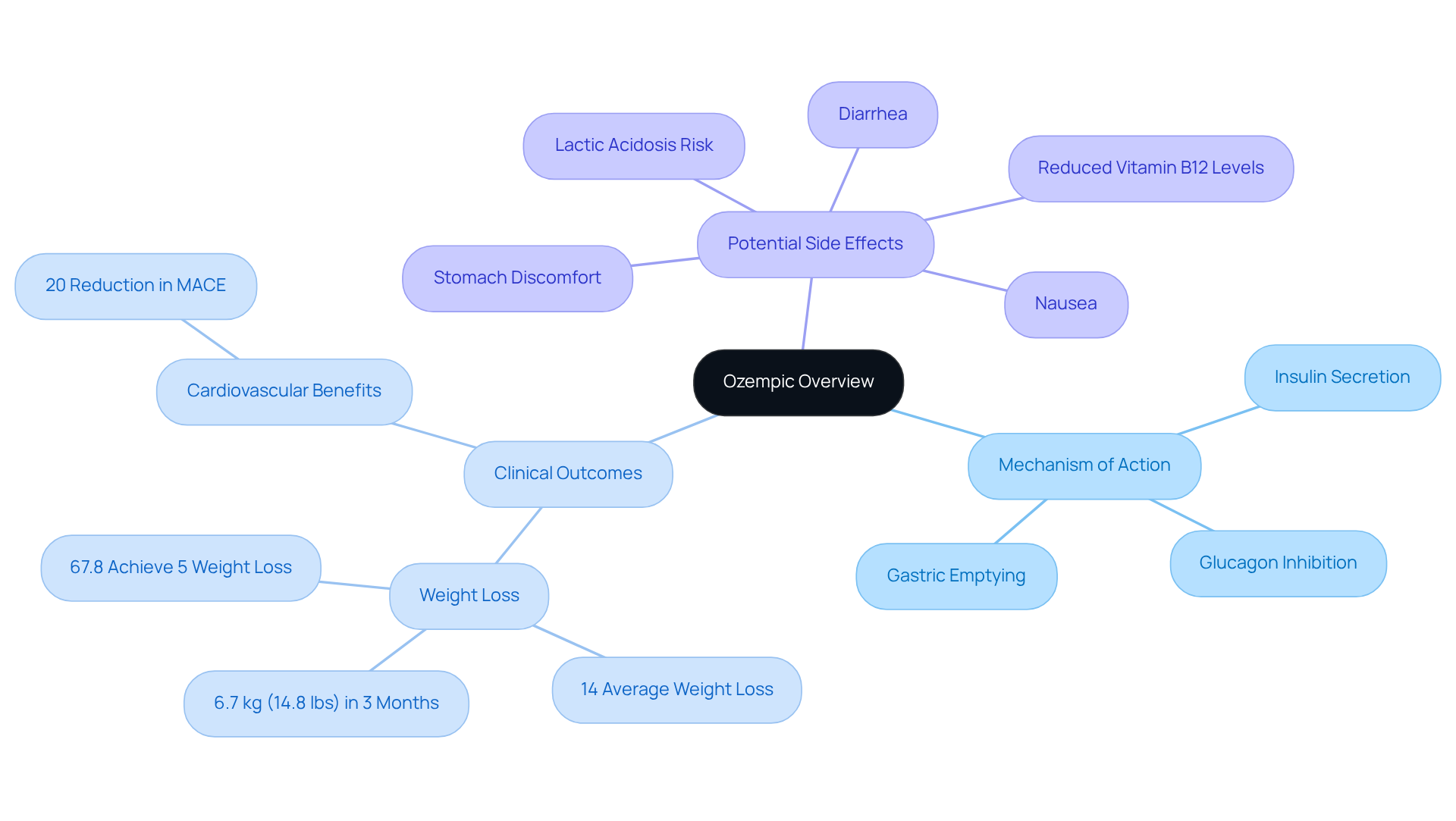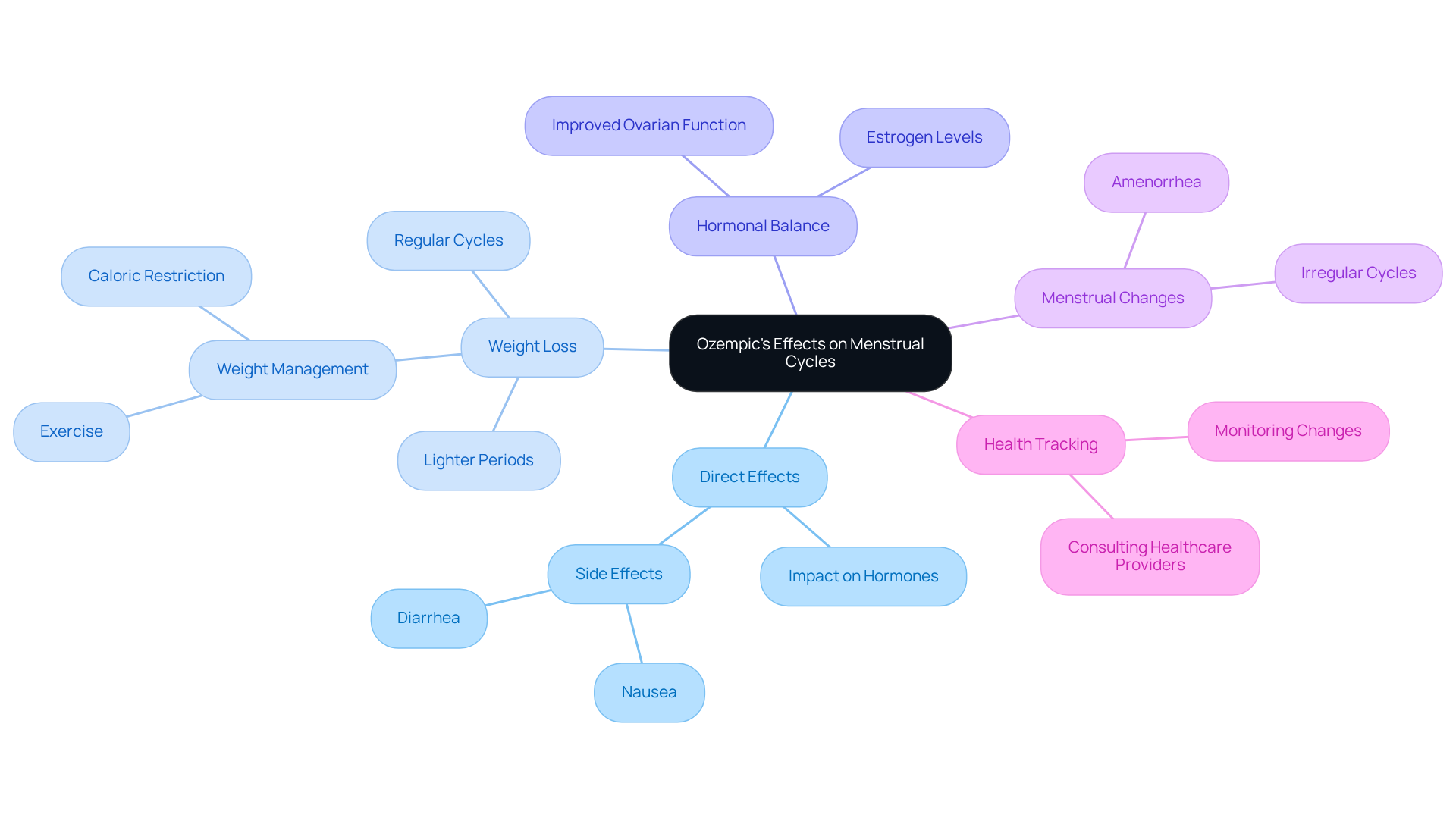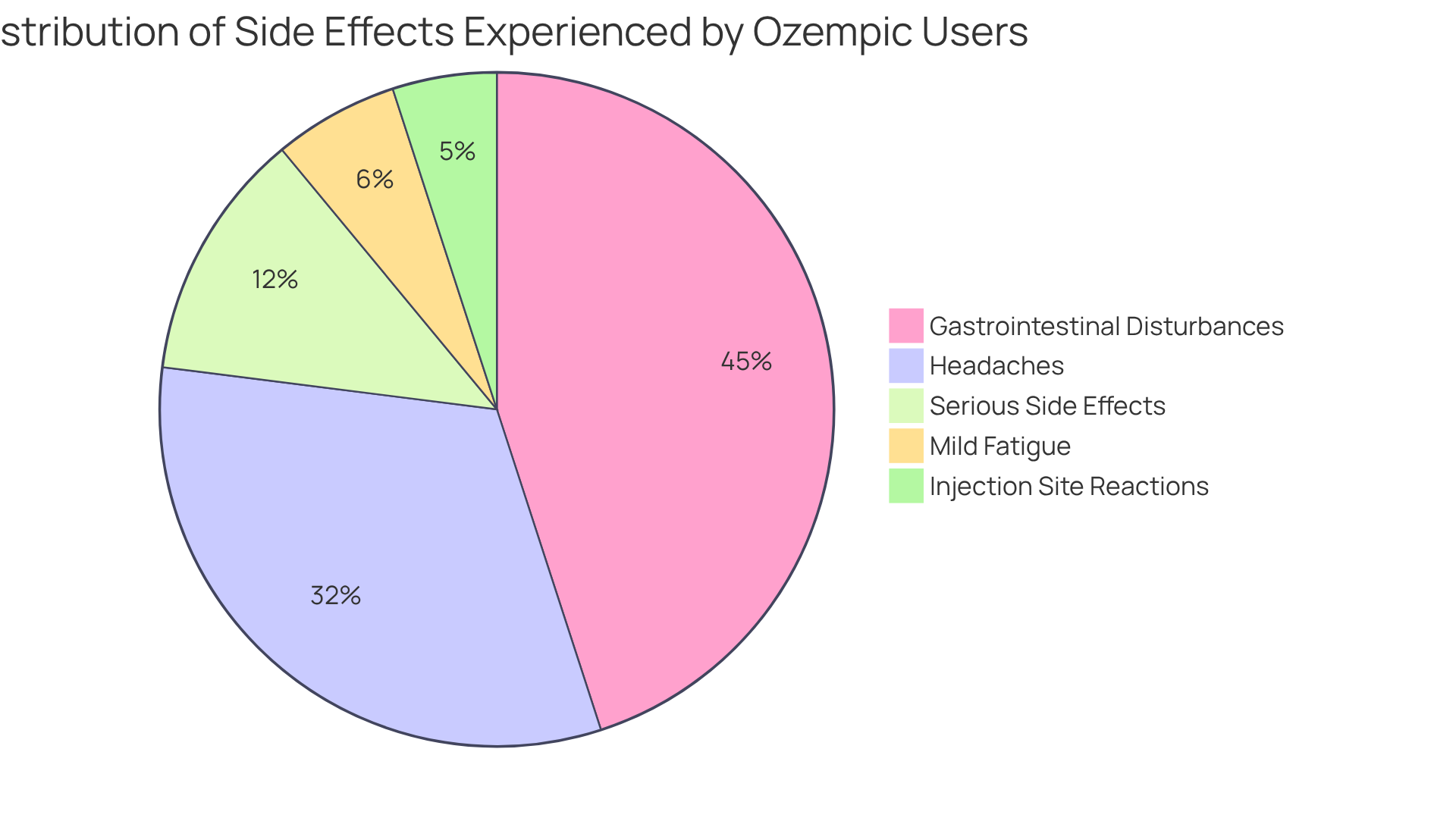Overview
While Ozempic may not directly impact menstrual cycles, it’s important to recognize that weight loss associated with its use can lead to changes in menstrual patterns. This may result in lighter periods or more regular cycles, thanks to improved hormonal balance.
Individual experiences can vary, and it’s crucial to monitor these changes closely. Remember, significant weight loss can influence reproductive health, so don’t hesitate to reach out to your healthcare provider if you have any concerns.
We’re here for you, and together, we can navigate this journey with understanding and support.
Introduction
In recent years, the rise of Ozempic as a treatment for type 2 diabetes and obesity has garnered significant attention, particularly for its impressive weight loss results. As more individuals turn to this medication, it’s natural to have questions about its broader implications, especially regarding women’s health and menstrual cycles.
This article delves into the potential effects of Ozempic on periods, exploring how weight loss associated with its use may lead to changes in menstrual patterns.
What should women consider about their reproductive health when using Ozempic? How can they navigate any unexpected changes? Together, we can explore these important questions and find the support you need on your journey.
Define Ozempic: Mechanism and Uses
Semaglutide, often known as a glucagon-like peptide-1 (GLP-1) receptor agonist, plays a significant role in helping adults with type 2 diabetes manage their glycemic levels while also supporting weight reduction for those facing obesity. By mimicking the GLP-1 hormone released in the gut after meals, it stimulates insulin secretion, inhibits glucagon release, and slows gastric emptying. This process effectively reduces appetite and caloric intake, addressing a common struggle for many.
Clinical studies reveal that individuals using this medication can achieve remarkable results, with an average weight loss of around 14% over 68 weeks. In fact, 67.8% of patients experience at least a 5% reduction in body mass within just a few months of starting treatment. Additionally, Ozempic brings cardiovascular benefits, significantly lowering the risk of major adverse cardiovascular events (MACE) by 20% in patients with type 2 diabetes.
However, it’s important to be aware of potential side effects, which may include:
- Stomach discomfort
- Nausea
- Diarrhea
- Reduced vitamin B12 levels with long-term use
- A rare risk of lactic acidosis if not used properly
At Minimal, we understand your journey and are committed to providing transformative solutions for weight loss without the need for insurance. Our dedicated team is here to support your success. With customized health solutions starting at just $49, effective weight reduction becomes more attainable than ever.
Our holistic approach includes thorough support and individualized care, empowering you to achieve and maintain a healthier body while enhancing your overall well-being. Remember, together, we can achieve your goals, and we’re here for you every step of the way.
Examine Ozempic’s Effects on Menstrual Cycles
Research suggests that while Ozempic itself may not directly influence menstrual cycles, it prompts the inquiry of how does Ozempic affect your period, especially since the weight reduction associated with its use can lead to changes in menstrual patterns. Have you noticed that significant weight loss might result in lighter periods or more consistent cycles? This is because obesity is often linked to irregular menstruation.
At Minimal, we understand your journey, and our comprehensive body reduction prescription program begins with a consultation to evaluate your health and identify the best treatment plan for you, which may include alternatives like Semaglutide.
We believe in combining medication with personalized fitness and nutrition plans to support your long-term success. Our fitness training program offers customized plans that align with your weight reduction goals, helping to enhance hormonal balance and cycle regularity. Some studies indicate that losing weight may improve hormonal balance, potentially leading to better ovarian function and more regular cycles. However, it’s important to remember that individual experiences can vary. Some women report irregular periods or changes in flow after starting the medication, raising the question of how does Ozempic affect your period.
That’s why we encourage you to track your reproductive health closely. If you notice significant changes, please consult your healthcare provider. We’re here for you, and together, we can achieve your goals for a healthier and happier life.
Consider Safety and Side Effects for Women Using Ozempic
This medication is generally well-tolerated, but it’s important for women to be aware of potential side effects. Have you ever experienced gastrointestinal disturbances like nausea, vomiting, or diarrhea? These issues affect approximately 45% of users, with 30.3% of participants using semaglutide reporting vomiting. Additionally, some women may notice changes in their menstrual cycles and may ask, does Ozempic affect your period, as these changes can manifest as heavier or lighter bleeding or even missed periods. Other side effects may include:
- Injection site reactions, such as redness or swelling
- Mild fatigue
- Headaches
While serious side effects are rare, they can include pancreatitis and thyroid tumors, so it’s essential to stay vigilant. Regular check-ins with your healthcare provider can help manage these side effects effectively.
If you’re pregnant or planning to conceive, consulting your healthcare provider is crucial, as this medication is not advised during pregnancy due to possible risks to the fetus. We recommend stopping the medication at least two months before planning a pregnancy. Dr. Maria Anton, an endocrinologist, emphasizes, “Monitoring and suitable guidance can aid in reducing the risks related to this medication, particularly for women.” This proactive approach ensures that the medication is used safely while addressing any concerns regarding whether Ozempic affects your period.
Furthermore, Ozempic can aid in significant weight loss by reducing hunger, improving blood sugar control in obese patients, and lowering the risk of heart disease and other weight-related conditions. Together, we can enhance your overall metabolic health and support your journey towards a healthier you.
Conclusion
The exploration of Ozempic’s impact on women’s health, particularly concerning menstrual cycles, reveals a complex interplay between weight loss and reproductive health. Many women may wonder: does this medication affect my periods? While Ozempic is primarily a treatment for type 2 diabetes and obesity, its weight-reducing effects can lead to changes in menstrual patterns. Understanding this relationship is crucial for women considering or currently using Ozempic.
Key insights highlight that while Ozempic itself may not directly alter menstrual cycles, the associated weight loss can lead to more regular periods and improved hormonal balance. Yet, individual experiences vary. Some women may encounter irregularities in their cycles or other side effects, such as gastrointestinal disturbances. It’s essential to monitor your reproductive health and consult healthcare providers if significant changes occur. Remember, you are not alone in this journey.
In conclusion, understanding how Ozempic affects menstrual cycles is vital for your health. As more individuals seek solutions for weight management and diabetes control, awareness of the potential implications for women’s health is crucial. Emphasizing the importance of personalized care and open communication with healthcare professionals can empower you to navigate your health journey effectively. Together, we can achieve your goals for a healthier and happier life.
Frequently Asked Questions
What is Ozempic and what is its active ingredient?
Ozempic is a medication that contains semaglutide, a glucagon-like peptide-1 (GLP-1) receptor agonist, which helps adults with type 2 diabetes manage their glycemic levels and supports weight reduction for those with obesity.
How does Ozempic work in the body?
Ozempic mimics the GLP-1 hormone released in the gut after meals, stimulating insulin secretion, inhibiting glucagon release, and slowing gastric emptying. This process reduces appetite and caloric intake.
What are the expected weight loss results from using Ozempic?
Clinical studies show that individuals using Ozempic can achieve an average weight loss of around 14% over 68 weeks, with 67.8% of patients experiencing at least a 5% reduction in body mass within a few months of starting treatment.
Does Ozempic provide any cardiovascular benefits?
Yes, Ozempic significantly lowers the risk of major adverse cardiovascular events (MACE) by 20% in patients with type 2 diabetes.
What are the potential side effects of Ozempic?
Potential side effects include stomach discomfort, nausea, diarrhea, reduced vitamin B12 levels with long-term use, and a rare risk of lactic acidosis if not used properly.
How does Minimal support individuals using Ozempic for weight loss?
Minimal offers transformative solutions for weight loss without the need for insurance, providing customized health solutions starting at $49, along with thorough support and individualized care to help individuals achieve and maintain a healthier body.




















